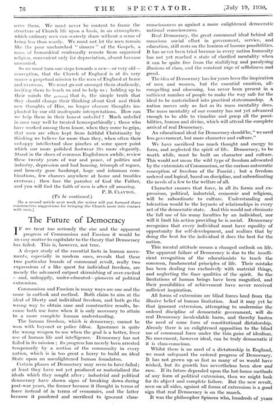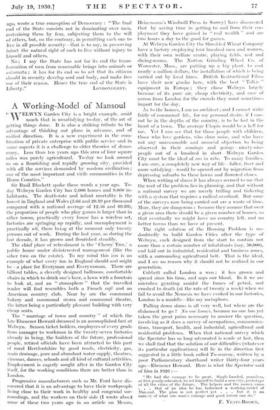The Future of Democracy
IF we treat too seriously the rise and the apparent progress of Communism and Fascism it would be an easy matter to capitulate to the theory that Democracy has failed. This is, however, not true.
A deeper study of the essential facts in human move- ments, especially in modern ones, reveals that these two particular brands of communal revolt, really two expressions of a like quest for individual freedom, are merely the advanced outpost skirmishing of over-excited —and, unhappily, under-educated—pioneers of political extremism.
Communism and Fascism in many ways are one and the same in outlook and method. Both claim to aim at the ideal of liberty and individual freedom, and both go the wrong way to obtain sane and constructive results, be- cause both use force when it is only necessary to attain to a more complete human understanding.
The human freedom, which is democracy, cannot be won with bayonet or police baton. Ignorance is quite the wrong weapon to use when the goal is a better, freer use of human life and intelligence.- Democracy has not failed in its mission ; its progress has merely been arrested temporarily by a section of the community in every nation, which is in too great a hurry to build an ideal State upon an unenlightened human foundaton.
Certain phases of Democracy may seem to have failed; at least they have not yet produced or materialized the ideals which they sought after ; industrial and political democracy have shown signs of breaking down during post-war years, the former because it thought in terms of force instead of in terms of economics, and the latter because it pandered and sacrificed to ignorant class-
consciousness as against a more enlightened democratic national consciousness.
Real Democracy, the great communal ideal behind all conscious social effort in government, service, and education, still rests on the horizon of human possibilities. It has never been tried because in every nation humanity has not yet reached a state of clarified mentality when it can be quite free from the stultifying and paralysing illusions of class, and the constant urge of selfishness and greed.
The idea of Democracy has for years been the inspiration of men and women, but the essential emotion, all- compelling and obsessing, has never been present in a sufficient number of people to make the way safe for the ideal to be materialized into practical statesmanship. A nation moves only as fast as its mass mentality does. The mass mentality of our country has not yet advanced enough to be able to visualize and grasp all the possi- bilities, human and divine, which will attend the complete arrival of real Democracy.
An educational ideal for Democracy should be," we need less government, but more character and culture."
We have sacrificed too much thought and energy to form, and neglected the spirit of life. Democracy, to be worth while, must be built on character and culture. This would not mean the wild type of freedom advocated by the extremists of Communism, or the curious autocratic conception of freedom of the Fascist ; but a freedom ordered and logical, based on discipline, and subordinating the needs of a few to the welfare of all.
Character ensures that force, in all its forms and ex- pressions, political, industrial, economic and religious, will be subordinate to culture. Understanding and toleration would be the keynote of relationships in every act of the democratic state. And this would not eliminate the full use of his many faculties by an individual, nor will it limit his action providing he is social. Democracy recognizes that every individual must have equality of opportunity for self-development, and realizes that by doing the best for the individual it does the best for the nation.
This mental attitude means a changed outlook on life. The apparent failure of Democracy is due to the insuffi- cient recognition of the educationists to teach the common, fundamental principles of life. Their mistake has been dealing too exclusively with material things, and neglecting the finer qualities of the spirit. So the limitations of human beings have been magnified, and their possibilities of achievement have never received sufficient inspiration.
All forms of extremism arc blind forces bred from the illusive belief of human limitation. And it may yet be that ignorant extremism, attempting to undermine the ordered discipline of democratic government, will do real Democracy incalculable harm, and thereby hasten the need of some form of constitutional dictatorship. Already there is an enlightened opposition to the blind use of communal force under the thin guise of idealism. No movement, however ideal, can be truly democratic if it is class-conscious.
Whilst there is no need of a dictatorship in England, we must safeguard the ordered progress of Democracy. It has not grown up so fast as many of us would have wished, but its growth has nevertheless been slow and sure. If its future depended upon the hot-house methods of any form of political extremism, then we might look for its abject and complete failure. But the new revolt, seen on all sides, against all forms of extremism is a good sign that real Democracy is on the march.
It was the philosopher Spinoza who, hundreds of years
ago, Wrote a true conception of Democracy : "The final end of the State consists not in dominating over men, restraining them by fear, subjecting them to the will of others, but, on the contrary, in permitting each one to live in all possible security—that is to say, in preserving intact the natural right of each to live without injury to himself and others.
No ; I say the State has not for its end the trans- formation of men from reasonable beings into animals or automata ; it has for its end so to act that its citizens should in security develop soul and body, and make free use of their reason. Hence the true end of the State is

















































 Previous page
Previous page